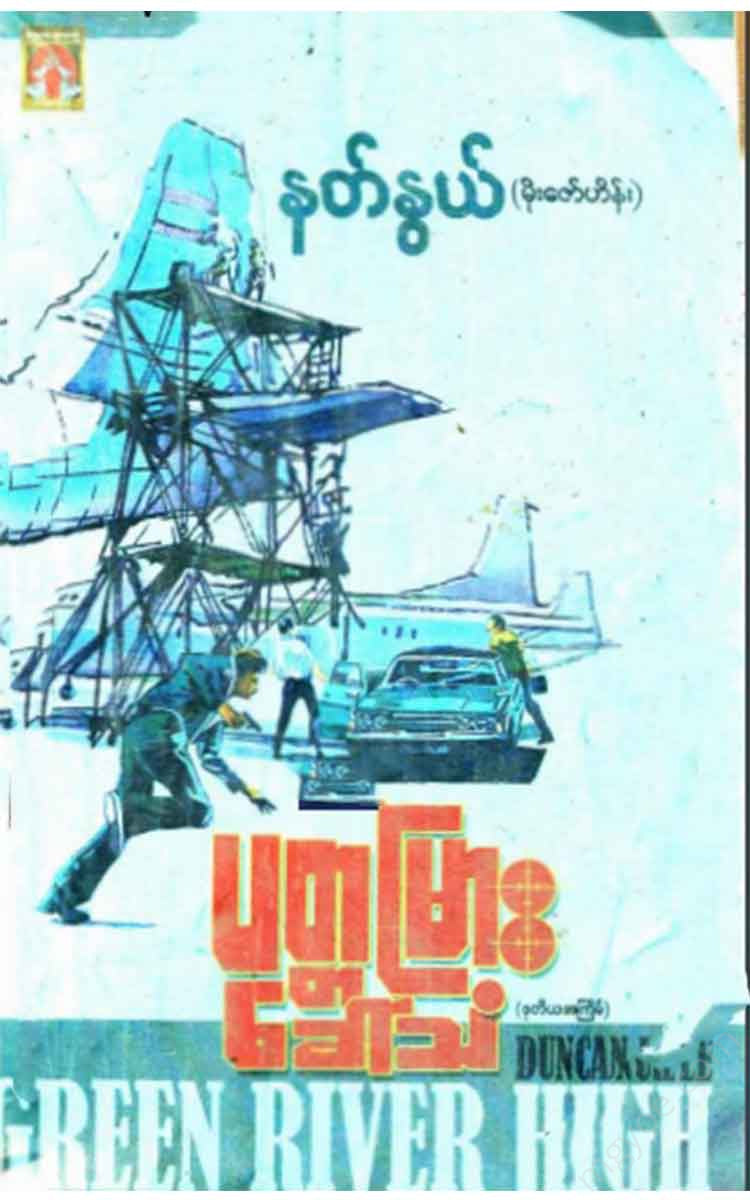Other Websites
Natnwe - Ruby Call
Natnwe - Ruby Call
Couldn't load pickup availability
Regarding the author.
Duncan was born in Bradford, Yorkshire, England.
He began his career as a junior reporter at the Bradford Telegraph and the Argyll and Bute. He then moved to the Lancaster Mercury and the Yorkshire Post. In 1955 he joined John Boo magazine in London. The magazine later became Today magazine. He then went to work at Home as managing editor. It was there that he wrote his first novel, A Cage of Ice.
The success of that novel led him to pursue his dream of becoming a full-time writer and continuing to write novels. The now translated Green River High is his seventh novel, first published in 1979.
-----
Today is Friday. It's going to be busy like any other Friday. Friday is going to be even worse. Because half the staff has the flu. Some of it is real. Some of it is fake.
When I woke up that morning, I really wanted to run away. My bed was warm, but the entire room seemed more suitable for penguins than for people.
I think about it. I want to run away. But it won't happen. It never will.
Both at school and in the army, the class leaders and drill sergeants instilled in the young men a sense of secularism. They only allowed them to play doubles tennis on Sunday evenings.
"Avoid opening the door to women." I avoid it. In fact, I rarely have women like that come to me.
A good officer says that he must feed his subordinates to the full before he even drinks a sip of water. Well. That's what he does. What's wrong? They eat their fill and then stuff it all into their pockets and take it away. And the way they look at you with their eyes is like they're saying something. Chief.
Responsibility. I am one of the last generations to know this word. I am also one who knows and understands the meaning of this word.
Once a person gets the meaning and necessity of this word stuck in his head, the thing called duty is like an alarm clock constantly reminding him. He will do things he doesn't want to do because of duty. Everything will be like this.
That's why. This Friday morning, I got up reluctantly. I shaved my beard and mustache. (A clean soldier is a brave soldier.) I prepared a good breakfast. (A soldier who has not eaten breakfast often collapses on the battlefield.)
I put on a pair of loose-fitting shoes. I also put on a loose-fitting suit. After taking a look outside through the window, I put on my raincoat again. Then I went to the bus stop...
"On rainy days like this, the bus is always late and always crowded. I can't wait any longer, so I have to stand and ride among those who can't wait like I can."
From what I said earlier, you might think of me as a soldier. But sadly, I am only a former soldier. The marks of a soldier are on me and inside me.
It was a cold, drizzling morning, and I had gone to the bank where I worked to finish my work. I had gone to settle an important matter. Two days before, the manager had called me into his office. The senior clerk had retired, and I was the oldest, and I was to be promoted to that position, and I would earn about a hundred and fifty pounds more a year. The manager, Barstock, gave me this news as if he were giving me the title of hero. That was why. When I said, "Let me think about it for a couple of days," he was very surprised. He was a man who always looked forward to a promotion. He had never been promoted often in his life. He had never once considered whether he should accept it or not.
In Stock's view, the position of counter clerk is 'a two-step ladder to heaven.'
But I see this job differently. Almost all the counter staff are women. Some are engaged, some are newly married. Some are pregnant. They work in the bank quite casually. They don't hesitate to take all the leave they deserve - sick leave, maternity leave.
"All the counter staff are your responsibility, Mr. Tunnicliffe. Do you understand that?" said the manager. I understood perfectly well.
"You have to take charge of all their tasks and all their problems. This is a place of responsibility, but you are a person who has fulfilled your duties for nine years."
As he continued his speech, I thought back to those nine years.
I think about the nine years and nine rains. I curse the nine years and nine rains. Today is the day I have to make a decision.
Actually, I have to accept the job. I really hate having to accept it.
What should I say once I get into the manager's room? It's clear.
"Yes, I accept. Thank you, sir."
This is the end of the Shorty Club. When I joined, I thought of it as temporary. I thought of it as a temporary place to make a living. If I found a better job, a more suitable job, I would move. But nine years have passed.
Now the sturdy bank door was completely closed in front of me. One of my legs was firmly tied to the long counter.
And what is the job I will do for the rest of my life? "I can't give you a day off on Thursday, Judith."
This is what I should say to Judith, who takes leave every Thursday. Then she will be offended. She will be cursed.
My job is to carry out important tasks with awareness and responsibility, as Varstok said.
This is what I thought at the time. But that very day, a story began.
The first incident was like this: A person next to me on the bus fainted and fell. There was no sign of anything, he just fell from a standing position in the middle of the bus.
I shouted for the car to stop. I picked up the man. He was put on a stretcher that someone had pulled out. He was pale and bleeding all over. He was breathing hard. But after a minute he came to. But he was still dizzy. So I told the ticket office. I had to stop at the next stop and call an ambulance.
However, ticket sales
"The hospital is about a mile ahead. It'll be faster if you take this car."
So we went by bus. When we arrived at the hospital, I carried the sick man to the hospital. But he was not tired. He was as light as a leaf. I was stuck in the emergency room for a long time. I explained the situation to the doctor. Finally, the doctor sent the old man to the cardiac examination room and let me go.
The result was that I was half an hour late for work. I was angry because punctuality was something I had always been good at. I couldn't break this habit. That's why I jumped off the bus. On the way to the bank, which was already open, I was always uncertain.
I was standing on the side of the road, about to cross the street to the bank, when a van stopped in front of me. The indicator was pointing to the right. The van, like me, was waiting for traffic to clear.
So I saw the man in the front seat through the foggy windshield. His face was strange. It was rough and rough. It looked like an unfinished sculpture. Then it turned. Behind it, another
There were about two cars. I can still see the face of the man from earlier in my mind.
The van stopped in the alley next to the bank. Before I could even open the door, a realization came to my mind. That strange face was covered with a sock.
They were going to rob the bank. "I was in the middle of the road, cutting through the cars. I was looking at the van out of the corner of my eye, as if watching the cars coming from the other side."
Four people quickly got out of the car. Two double-barreled guns were visible. Two shotguns were visible. Smoke was coming out of the exhaust pipe. It must have been because the car was running. If so, there must have been a fifth person in the car.
They're not running. They're walking briskly towards the entrance. "Three people went inside, one remained at the door. He had a double-barreled gun in his hand. He was facing the street.
He lowered the gun and aimed it. The butt of the gun rested on his right hip.
Cars were passing between him and me. Then a lorry passed, then a bus. I was out of sight. He was out of sight too. The bus stopped in front of me. A few people were getting out of the bus. I saw the bus and joined them. I kept my eyes on him. He pretended to cross the road by the bank. It was to his right. If he had waved his gun, the butt would have hit his hip.
"Mom"
A child screamed in terror. "I was about seven or eight feet away from him. I had my back to him. I stood at the end of the sidewalk behind the blue van."
"Shut up"
I heard him scream loudly. His attention was on the child and his mother. Only for a moment. But in that moment, I turned around, supporting the van with one hand. Then I took two quick steps and jumped on him.



